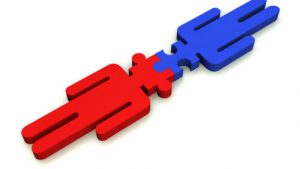
Building effective teamwork in the workplace is vital to any organisation’s success. As Steve Jobs put it, “Great things in business are never done by individuals. They’re done by teams”. With teams being more important than ever, I speak to managers all the time who need to improve their team’s performance, but don’t know where to start.
 Finding the right parts of your teamwork to celebrate and the right areas to develop is a complex business – but it needn’t be confusing. To get your team moving in the right direction, best take a CAB!
Finding the right parts of your teamwork to celebrate and the right areas to develop is a complex business – but it needn’t be confusing. To get your team moving in the right direction, best take a CAB!
Behind any team performance improvement activity there are three areas (CAB) that you need to address to identify blocks and make positive change. As presented by Kozlowski and Bell in 2003, these key moderators can be categorised as either: Cognitive; Affective-Motivational; Behavioural.
Over three posts, I will lay out this simple structure for how to make sense of your teamwork and identify strengths and development needs, opportunities to reward and celebrate, and what to focus on to make the biggest difference.
This first post explores cognition – how individual thinking and knowledge needs to become team thinking and knowledge.
This is the place to start. For your team to succeed, you need people to have excellent understanding of what each other think and know. This includes having clarity on the task and mission of the team, the local environment in which you operate, the goals and purpose. Note: this applies not just on the team level, but for each individual in the team when they have their own unique tasks, environment, goals, etc.
 Also, knowing what your team mates can do, what they know about, what they perceive and feel about things related to the team, what they are interested in, and who they are connected with.
Also, knowing what your team mates can do, what they know about, what they perceive and feel about things related to the team, what they are interested in, and who they are connected with.
I frequently work with teams that have big gaps in this knowledge. Often people are just bad at it – the business demands that they’re high performing individual contributors, so their plates are too full from their individual task demands to take the time and energy to talk about this stuff.
It’s also a symptom of the fact that modern work teams change and grow frequently – in structure, leader, remit, members, etc. Add to this that teams are often virtual (in part at least) and quickly managing knowledge is a major challenge!
But, when you get higher levels of cognition, you have the chance to access a far larger pool of task-relevant information that is vital to reaching those higher performance levels. Investing in team cognition unlocks phenomenal, often hidden, informational resources in the team and its larger network. This is powerful team learning!
So, what do your people know about what each other do, can do, have done, want to do, know about, and care about? Do they know each other personally, their connections and networks, their likes and dislikes, styles and preferences, family and interests?
You can get some great quick wins by building better cognition in your team.
In the next post, I focus on the ‘A’ of CAB: Affective – motivation… Why people do, or don’t, buy-in and commit to the team.
I’d love to hear your thoughts. Comment below.
Contact: marcus@mrdynamics.com or through Linkedin
Ref: Kozlowski and Bell in 2003
